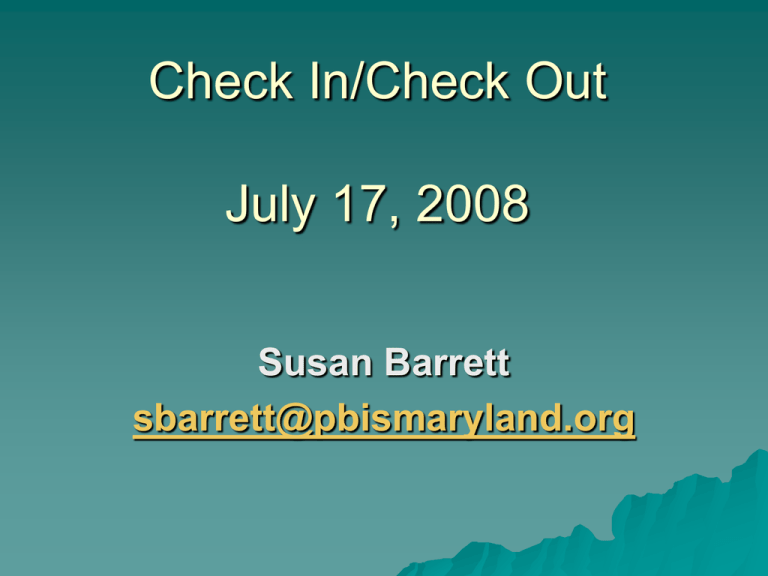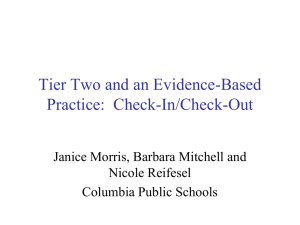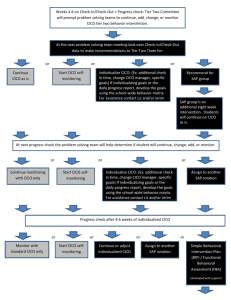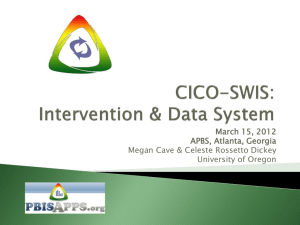Check In/Check Out July 17, 2008 Susan Barrett
advertisement

Check In/Check Out July 17, 2008 Susan Barrett sbarrett@pbismaryland.org Agenda Overview & Essential Features CICO Example: Indian Head Elementary Are you Ready? Getting Started and Action Planning – Personnel – Referral Process – Daily Progress Report and Determining Goals – Progress Monitoring – Acknowledgement System – In-service and ongoing communication for staff, parents, students Acknowledgements Rob Horner, Leanne Hawken, Rob March, Anne Todd Charles County MD Indian Head, Matthew Henson MS Fern Ridge Middle School Clear Lake Elementary Bohemia Elementary Kennedy Middle School Effective Behavior Support Team- University of Oregon Core features Behavioral Priming/ Behavioral Momentum – Start school off positively – Start each class off positively Student recruitment of contingent adult attention – Approach adults (teachers/ family) Predictability Self-management Data-based decision-making Excruciating Efficiency Research Support Pre schools Sandy Chafouleas, et al 2007 Elementary Schools – – – – – – Anne Todd et al in press 1. At least 5 peer Sarah Fairbanks et al, 2007 reviewed studies Amy Kauffman-Campbell, dissertation 2. At least 3 different Doug Cheney et al, 2006; 2007 researchers/settings Leanne Hawken et al. 2007 Filter et al., 2007 Middle Schools – Leanne Hawken et al 2003 – Rob March et al 2002 CICO is an Evidence-Based Practice High Schools 3. At least 20 different participants Core Support Program: Provided to all, intended to reach most. As the magnitude of the problem increases…. The required resources to address the problem increases The need to enhance environmental structures increases Continuum of Supports The frequency for collecting and acting upon information increases SCHOOL-WIDE POSITIVE BEHAVIOR SUPPORT ~5% ~15% Tertiary Prevention: Specialized Individualized Systems for Students with High-Risk Behavior Secondary Prevention: Specialized Group Systems for Students with At-Risk Behavior Primary Prevention: School-/ClassroomWide Systems for All Students, Staff, & Settings ~80% of Students SCHOOL-WIDE POSITIVE BEHAVIOR SUPPORT ~80% of Students Student Recommended for CICO CICO Implemented CICO Coordinator Summarizes Data For Decision Making Morning Check-in Parent Feedback Regular Teacher Feedback Weekly CICO Meeting to Assess Student Progress Afternoon Check-out Revise Program Exit Program What is different about CICO? Uses Systems Logic – Team approach – Social marketing – Administration makes priority – Easy for teachers to implement- teach staff the process to access help Uses Data – Tracks specific students- continuous feedback– Feedback and celebrations with all staff How is CICO Different Than Other “Behavior Card” Interventions A Targeted Intervention Implemented Within a School-Wide System of Behavior Support – Behavior Cards typically classroom interventions Implemented in all settings, throughout the school day All teachers and staff are trained Students identified proactively & receive support quickly Team uses data for decision making to determine progress Behavior Education Program (CICO) Features: Students identified and receive support within a week Check-in and check-out daily with an adult at school Regular feedback and reinforcement from teachers Family component Daily performance data used to evaluate progress Daily Progress Report 1/5 Goals 2/6 3/7 HR 4/8 Be respectful 2 1 0 2 1 0 2 1 0 2 1 0 2 1 0 Be responsible 2 1 0 2 1 0 2 1 0 2 1 0 2 1 0 Keep Hand & Feet to Self 2 1 0 2 1 0 2 1 0 2 1 0 2 1 0 Follow Directions 2 1 0 2 1 0 2 1 0 2 1 0 2 1 0 Be There – Be Ready 1 0 2 1 0 2 1 0 2 1 0 2 1 0 TOTAL POINTS 2 CICO Process (cont.) Weekly or Bi-weekly Principal Recognition – CICO coupon with graph attached Data shared with all staff at least quarterly 9-Week graph sent to parents Point Sheet Name: Date: Morning Work Reading Math Afternoon 3 2 1 3 2 1 3 2 1 3 2 1 Say nice things or no things to other people. 3 2 1 3 2 1 3 2 1 3 2 1 Follow adult directs the first time. 3 2 1 3 2 1 3 2 1 3 2 1 Keep my hands, feet, body and objects to myself. Goal met? POINT SHEET Name:__________________ Date:______________ = 2 points = 1 point = 0 points GOALS Keep my hands, feet, body, and objects to myself. Say nice things or no things to other people. Follow adult directions the first time. Morning Reading Points received________________ Points possible________________ Daily goal reached? YES NO Math Afternoon The Response: Targeted Interventions “Targets” groups of students (>10) who: fail to respond to school-wide and classroom expectations are not currently engaging in dangerous or extremely disruptive behavior Efficient - Similar set of behavioral strategies are used across a group of students needing similar levels of support Effective – Decreasing problem behavior in classroom, increasing academic engagement, & decreasing office discipline referrals ( Crone, Horner, & Hawken, in press; Hawken & Horner, in press; March & Horner, 2002) Critical Features of CICO Intervention is continuously available Rapid access to intervention (72 hr) Very low effort by teachers Positive System of Support – Students agree to participate Implemented by all staff/faculty in a school Flexible intervention based on assessment – Functional Assessment Adequate resources allocated (admin, team) – weekly meeting, plus 10 hours a week Continuous monitoring for decision-making Why does the CICO work? Improved structure Prompts throughout the day for correct behavior System for linking student with at least one adult Increase in contingent feedback Feedback occurs more often and is tied to student behavior Inappropriate behavior is less likely to be rewarded Elevated reward for appropriate behavior Adult and peer attention Linking school and home support Organized to morph into a self-management system Indian Head Elementary Charles County PBIS Exemplar School 2005 Targeted Team Nomination 2005 SET The Systems-wide Evaluation Tool (SET) is designed to assess and evaluate the critical features of school-wide PBIS across each academic school year. Indian Head received Exemplar Status for ST 2004-05 SET Score 85% Score Indian Head ES 100 100 100 90 88 83 80 100 75 70 60 50 50 40 30 20 10 0 Expectations Defined Behavioral Expectations Taught On-Going System for Reward System Responding to Behavioral Violations 2004-05 Monitioring and Decision Making Leadership District-Level Support Targeted Team Identification and Training of Team PBIS Summer Institute 2005 – Dr. Leanne Hawken Identified 2 BEP Coordinators Staff trained August 2005 BEP initiated with 25 students BEP-Fidelity of Implementation Measure 88% Total Referrals by Year September-November 250 202 69% decrease 200 150 100 63 50 0 2004-05 2005-06 Average Referrals September- November 2004-05 SY = 3.5 referrals/day 2005-06 SY = 1 referral/day Referrals by Location Referrals by Student 2004-05 Referrals by Student 2005-06 69% decrease Referrals by Problem Behavior 75% Decrease In Number of Physical Contacts 89% decrease in number of incidents of Bullying and Harassment Out of School Suspensions September- November 45 41 40 86% decrease 35 30 25 20 15 10 5 5 0 2004-05 2005-06 Cost Benefit Referrals decreased by 139 If administrators spent 15 minutes processing each referral then administrators recovered 285 minutes. If students miss 45 minutes of instructional time for each referral, then 6,255 minutes of instruction have been regained. Cost Benefit If administrators spend 3 hours to process each suspension, then administrators have recovered 18 days of time. If students miss 6 hours for each suspension, students have recovered 36 days of instruction!!!! Getting the CICO Started In Your School Things to Consider First… Establishment of a Universal System (School-Wide) Does Not Guarantee Individual Teachers are Implementing with High Integrity Students Who Appear “At-Risk” May Benefit More When Teacher Improves Skills in Behavior Management Then Participate in Targeted Interventions Is It Really Resistance For Intervention? Before Implementing a Secondary Intervention, You Must Ask: Is the Student Receiving an Adequate “DOSE” of the Universal Intervention? Components often overlooked: Positive Parent Contact Random Reinforcement Strategies Positive Public Posting Continuous Behavioral Feedback for Students Data on Positive Reinforcement Other Enhancements… Tracking the Positive Analysis of number of positive behavior tickets to discipline tickets to insure maintenance of at least 4:1 ratio Analysis of number of positive behavior tickets by group (e.g., atrisk & high risk groups) Analysis of number of positive behavior tickets by teacher Keep a Positive Ratio 1000 900 800 700 600 500 400 300 200 100 0 Tiger Bucks ODRs Sept. Oct. Nov. Dec. Jan. Feb. Mar Apr Is My School Ready to Implement a CICO System? (see CICO Self Assessment Questionnaire) School-wide system of behavior support in place (SET Score 80% or higher) Staff buy-in for implementation of the CICO Administrative support – Time & money allocated No major changes in school climate – e.g. teacher strikes, administrative turnover, major changes in funding CICO implementation a top priority How Do You Build Student and Staff “buy-in” for the CICO? Give CICO program a high profile in your school Promote CICO as positive support not punishment Collaboratively involve referring teachers in CICO process Provide regular feedback to staff, students, and families Personnel: CICO Coordinator Take care of CICO requests for assistance Lead morning check-in/ afternoon checkout Enter CICO data on spreadsheet – daily Organize and maintain records Create graphs for CICO meetings Gather supplemental information for CICO meetings Prioritize CICO students for team meetings Characteristics of an effective CICO coordinator Flexibility within job responsibility (e.g., educational assistant, counselor, behavior health aide) Positive and enthusiastic Someone the students enjoy and trust Organized and dependable Works at school every day Personnel: CICO Team Attend weekly or bi-weekly meetings Contribute to decision making for CICO students Help conduct “Orientation to CICO” meetings Gather supplemental information Contribute to student/staff development workshops Contribute to feedback sessions Complete any assigned tasks from CICO meeting Resources: Time and Money 8-10 hours per week for CICO coordinator CICO forms on NCR paper School supplies for CICO participants Reinforcements for CICO participants What’s in a Name? Behavior Education Program – Daily Progress Report Kennedy Card Program – Kennedy Card Hello, Update, & Goodbye (HUG program) – Hug Card Check and Connect *Caution with Using “Behavior Card” or “Behavior Plan” For Whom is the CICO Appropriate? APPROPRIATE – – – – Low-level problem behavior (not severe) 3-7 referrals Behavior occurs across multiple locations Examples • talking out • minor disruption • work completion INAPPROPRIATE – Serious or violent behaviors/ infractions – Extreme chronic behavior (8-10+ referrals) – Require more individualized support • Functional Assessment • Wrap Around Services How will students be identified? Everyone is informed about intervention and referral procedure!! Referral Procedures- What does the form look like? Who gets the form once completed? – – – – Decision Rules about ODR Nurse or Counselor referral Teacher Referral Parent Referral How to identify students for CICO Other Data to Consider – Absences & Tardies – In school detentions (lunch-time or after school) – Other Designing Daily Progress Reports Determine behavioral expectations – School-wide expectations – Academic vs. behavioral expectations Expectations stated positively Range of scores vs. dichotomous scoring – Rating scales should be age appropriate Teacher friendly – circling versus writing & place for teacher initials – consistent expectations versus individual expectations Data easy to summarize and determine if goal is met HAWK Report Student _______________Teacher___________________ Date ________ Be Safe 0 = No 1= Good 2= Excellent Be Respectful Keep hands, feet, and objects to self Use kind words and actions Be Your Personal Best Follow directions Class 0 1 2 0 1 2 0 1 2 Recess 0 1 2 0 1 2 0 1 2 Class 0 1 2 0 1 2 0 1 2 Lunch 0 1 2 0 1 2 0 1 2 Class 0 1 2 0 1 2 0 1 2 Recess 0 1 2 0 1 2 0 1 2 Class 0 1 2 0 1 2 0 1 2 Total Points = Points Possible = Today ______________% 50 Teacher initials Working in class 0 1 2 0 1 2 0 1 2 0 1 2 Goal ______________% KENNEDY CARD Name _____________________________________________________ Material s To Class Worked and Let Others Work Follow Directions the First Time Teacher 2 1 No 2 1 No 2 1 No Assignments: 2 1 No 2 1 No 2 1 No Assignments: 2 1 No 2 1 No 2 1 No Assignments: 2 1 No 2 1 No 2 1 No Assignments: 2 1 No 2 1 No 2 1 No Assignments: 2 1 No 2 1 No 2 1 No Assignments: Wow, Wow, Wow, Wow, Wow, Wow, = _____ 36 Goal = Parent Progress Monitoring CICO Check-in/Check-Out Record Date:__________________ CICO Coordinator:_________________ Check-In Check-Out Student Name Paper Pencil Notebook CICO parent copy Jason √ Leanne Juan √ Kiran √ Alexa √ Jacey √ √ √ √ √ √ √ √ 90 85 √ √ √ CICO Score 60 100 √ √ 95 √ √ 90 Tracking Student CICO Progress (number = % of total daily points) Date Jason Leanne Juan Kiran Alexa 1/16/03 85 95 100 80 65 1/17/03 100 100 100 75 77 1/18/03 77 0 100 85 63 1/19/03 45 75 95 92 85 1/20/03 88 89 77 89 90 1/23/03 79 0 100 95 95 1/24/03 95 67 85 100 78 o f P o in ts Daily Data Used for Decision Making Ryan's BEP Performance 2000-2001 P e rc e n ta g e 100 80 60 40 20 0 03/07 03/08 03/09 03/12 Date 03/13 03/14 P e r c e n t a g e o f P o in t s Daily Data Used for Decision Making Rachelle's BEP Performance 2000-2001 100 80 60 40 20 02/05 02/08 02/13 Date 02/20 02/23 Decision Rules Rapid Responder Honeymoon Responder Slow and Steady Responder What will be the General Decision Rules around rates kids will respond? CICO Trading Post Points Required Wants attention Wants item/activity Wants to escape attention 100 pts Take note to office/teacher Ask a peer to play/read/draw Be a leader Principles recess Trip to treasure chest Choose a snack Choose a 5 min. activity School wide sticker Principles recess Computer 250 pts Computer More Time 400 pts Out with a friend Extra sharing time to lunch with TBA Class recess, free time, or popcorn party time for selected activity Free ticket to sporting event New school /art supplies by self time alone Independent work space Wants to avoid something Short break Alternative activity Alternative assignment Get out of school early Modifying CICO Peer attention: Provide peer attention for meeting expectations – Check out with friend – Sit with friend(s) at lunch – Brief free time with friend at end or class Task avoidance: – breaks, shorten work requirement – Access to assistance – Preferred work modality (e.g., groups) Schedule of reinforcement – More frequent check-ins – Highly preferred coordinator – Pair attention with other rewards Training Teachers on CICO System In-service on the “spirit” of program – supportive, not punitive – immediate feedback on behavior (type of statements, what the ratings mean, examples of feedback) – follow-up forum to express concerns – individual coaching – boosters needed at least yearly Training Students on CICO System Meet with parents and students Modeling and Practice Accepting Feedback Decision-Making –Goal Ongoing Communication Staff, Parents – Remember Indian Head – New staff, students, parents – Sustaining CICO Frequently Asked Questions Regarding CICO Implementation What if the student does not check-in in the morning? What if the student is not checking-out in the afternoon? What if a student is consistently not checking in and/or checking out? What if the student loses his/her CICO Card? What if the student is consistently participating in the CICO and his/her behavior gets worse? Activity: Designing Daily Progress Reports (DPR) for your school Questions to think about: – What will the behavioral expectations be Consistent with school-wide expectations? – Consistent across students or individualized? – Expectations positively stated? – Is the DPR teacher friendly? – Age appropriate and include a range of scores? – Data easy to summarize? Implementing CICO with Individual Students Effective School–Wide System in Place Student not responding to school-wide Expectations Implement Basic CICO •Increased structure, check-in, checkout •Frequent feedback •Connection with key adult Implement Basic CICO Is the Basic Is CICO Working? Yes •Continue with Basic CICO • Transition to selfmanagement No Conduct Brief Functional Assessment •What is the problem behavior? •Where does the problem behavior occur/not occur? •Why does the problem behavior keep happening? Building on Efficiency: “Simple FBA” Full FBAs: – Record review, interviews, observations – Specify problem behavior and contingencies within routines for purpose of individualized intervention design Simple FBAs: – Interviews – Specify problem behavior, routines surrounding problem behavior, and function of behavior for purpose of selecting type of CICO Matching CICO to Student Needs Basic CICO: goals related to cooperative, respectful behavior; reinforced through daily positive adult contact (attentionrelated) CICO + Academic Support: goals, prompts, and encouragement for organizational and routine-following behaviors or increase in academic support Escape CICO: goals related to cooperative, respectful behavior: students reinforced through chance to earn a break from aversive activity or aversive social contact Conduct Brief Functional Assessment Is the behavior maintained by escape from social interaction? Is the behavior related to lack of academic skills? Is the behavior severe, complex, intensive? Escape Motivated CICO CICO + Academic Support Intensive, Individualized Behavior Support •Reduce adult interaction •Use escape as a reinforcer •Increase Academic support (e.g., Full FBA-BSP Working Smarter- Not Harder Initiative, Project, Committee CICO Team Character Education Safety Committee School Spirit Committee Discipline Committee DARE Committee Attendance Committee Purpose Outcome Target Group Staff Involved Evaluating CICO Progress: Sample Agenda Form CICO Team Meeting Agenda Date:____________ Note taker:___________ Team Members Present:___________________________ List of Priority Students: 1) Discuss Priority Students 2) Discuss New Referrals 3) Identify Students to Receive Additional Reinforcer by Principal 4) Other CICO Issues or Students CICO element Variations/ options Considerations Educational/instructional assistant School counselor High school mentor Consistency Efficiency One person or two Freeing up time for person to do the job well 2. Check in/out routine Come to school early Leave class early Same location/different locations What about tardy students? Missing instruction time How does it work for busers, walkers, car riders? 3. Point system and daily report card Numbers/words/smiley faces 0, 1, 2 1, 2, 3 great, OK, bad (difficult time) Age appropriate I get a point for being honest/ trying (1, 2 , 3) 4. Report home Meet with parents individually as part of the CICO training Provide ideas for comments to write back, things to say to student, how to deal with a bad day Staff mentor signs off if family can’t Parents might correct student again Student may forge parent signature 5. Identifying students to participate Final recommendation by TAT Review of ODRs, teacher concern, family request, student request, administrator request Avoid making this a ‘punishment’ 6. Staff training A few at a time (start small to build routine & success) All at once Efficiency in teaching time Won’t remember unless using CICO What happens when a student gets an office discipline referral? 1. Coordinator(s) CICO element Variations/ options Considerations 7. Student training As a group Individually Daily prompts for routine the first five days What to do if staff/teacher isn’t available Teach students to remind staff/teachers to use program Loss of card during the day 8. Substitute staff Train a back up check in and check out person Rotate roles so many people can contribute as needed Administrator Front office staff for tardy students CICO cheat sheet for substitute teacher folder Lack of opportunity to maintain fluency, positive practice, consistency Prevent punitive approach 9. Point trading system Spending schedule Need a variation of items/activities to fit many situations Discounted school activities work really well Prizes/activities for whole class are great for kids who like peer attention Too often Not often enough Student absent on spending day Financial costs for rewards Time costs for staff who are ‘earned’ 10. Team meeting to review student progress Weekly data review, call a meeting as needed Email check in with teachers/families Coordinator not available/ no meeting… no meeting/ no data review…. No data review.. program and/or kid get a bad name if it doesn’t work



